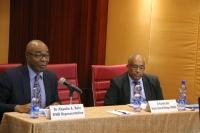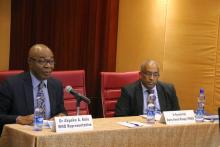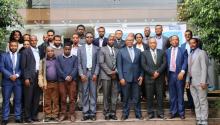WHO Committed to Strengthen Tobacco Control in Ethiopia
Addis Ababa, 15 February 2017 – The World Health Organization Country Office in Ethiopia in collaboration with the Food, Medicine and Health Care Administration and Control Authority of Ethiopia (FMHACA), organized a two-day policy dialogue on Intersectoral Action for strengthening Tobacco Control. The dialogue took place in Addis Ababa 14-15 February 2017, and brought together officials and experts from Ministry of Finance and Economic Development, Ethiopian Revenue Customs Authority, Office of Attorney General, Federal Food, Medicine, Health Care Administration and Control Authority (FMHACA), Addis Ababa City Administration FMHACA, and WHO African Region as well as WHO country Office in Ethiopia.
The dialogue deliberated on the status of tobacco control implementation, challenges and the necessary high-level decision and support to achieve the objectives of reducing tobacco consumption, and eventually reduce morbidity and deaths related to tobacco use.
In his opening remarks, Dr Akapaka Kalu, WHO Representative to Ethiopia commended the FMHACA for its concerted efforts and role of coordination in the strengthening of tobacco control in Ethiopia. “It is high time for all of us in our respective organizations to contribute and take appropriate measures to create a smoke-free and healthier working environment”, he noted.
Dr Kereyidin Redi, Deputy General of FMHACA, on his part expressed Ethiopia’s commitment to tackle the effect of non-communicable diseases by working in close collaboration with different institutions and involving the youth in the process. “Accordingly”, he underscored, “Ethiopia has ratified the WHO FCTC and adopted it into the national law”.
According to WHO reports imposing higher taxes would decrease consumption and discourage new smokers. To this end, Dr Kereyidin highlighted that Ethiopia’s taxes on tobacco products in line with the article (6) of the convention is not sufficient on its own. “I expect the outcomes of this policy dialogue to lay a ground work for our future endeavor to increase taxes rates and to strengthen the implementation of article (5) which deals with control of illicit trade of tobacco”, he added.
Dr Kereyidin hailed WHO and other partners for organizing this platform.
Dr Kalu assured Dr Kereyidin and his office that WHO is committed to helping the country in its efforts towards the Tobacco control.
The tobacco epidemic is one of the biggest public health threats the world has ever faced, killing around 6 million people a year. More than 5 million of those deaths are the result of direct tobacco use while more than 600 000 are the result of non-smokers being exposed to second-hand smoke.
The two-day policy dialogue on Intersectoral Action for strengthening Tobacco Control concluded with action plans drawn to initiate tobacco taxation change process, promote the ratification of the WHO Protocol on elimination of tobacco illicit trade, strengthen enforcement of tobacco control laws, and participants agreed to further strengthen intersectoral engagement and harmonize the activities undertaken.
It is to be recalled that, the FCTC is the first international treaty negotiated in response to the globalization of the tobacco epidemic and has become one of the most widely embraced treaties in the history of the United Nations with 180 Parties covering 90% of the world's population with main objective to decrease the demand and supply of tobacco and tobacco products. Accordingly, Ethiopia has ratified the FCTC on 21 January 2014 and following its ratification the FMHACA has issued a national tobacco control directive in 2015, in support of implementation of the FCTC. WHO played significant role in supporting the processes before and after ratification through technical assistance, resource mobilization and facilitating capacity building locally and internationally.
________________________________________________________
For more information, please contact:
Dr Abebayehu Assefa Mengistu, Non Communicable Diseases Team Leader
Email: mengistua [at] who.int (mengistua[at]who[dot]int)
Tel: +251 911 500 324
Wassihun Melaku, Health Promotion Officer
Email: belayw [at] who.int (belayw[at]who[dot]int) ,
Tel: +251 919 795 722;
Selam Fesseha, Communications Officer
Email: fessehas [at] who.int (fessehas[at]who[dot]int)
Tel: +251 9 84796869
Below:
01 Dr Akpaka Kalu, WHO Representative to Ethiopia and on his left Dr Kereyidin Redi, Deputy General of FMHACA
02 Group Picture: Policy dialogue on Intersectoral Action for strengthening Tobacco Control





